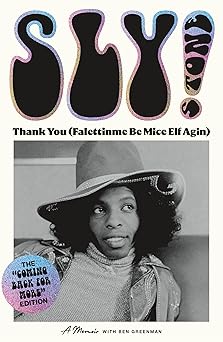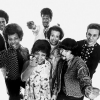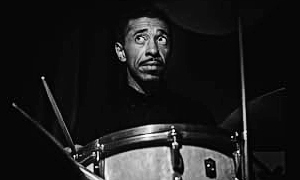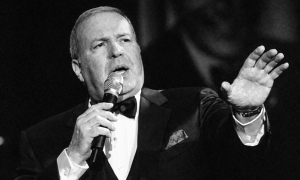Home » Jazz Articles » Book Review » Sly Stone: Thank You (Falettinme Be Mice Elf Agin) - A M...
Sly Stone: Thank You (Falettinme Be Mice Elf Agin) - A Memoir (Paperback)
 Thank You (Falettinme Be Mice Elf Agin): A Memoir: (paperback)
Thank You (Falettinme Be Mice Elf Agin): A Memoir: (paperback) Sly Stone with Ben Greenman
336 Pages
ISBN-13: 978-1250872265
Macmillan Publishing/AuwaBooks
2024
Reading Thank You (Falettinme Be Mice Elf Agin): A Memoir, it' is hard to know who to compliment most (even if no additional content appears in the softcover edition). Is it Sly Stone for his rapid fire recollection or co-writer Ben Greenman for helping maintain some flow to the prose thereof? Or is it Questlove for his patience and perseverance in making sure the book was published?
In the end, it hardly matters. The pleasure that arises from close perusal of the iconic subject's autobiography is so deep and abiding such matters become moot, in part because of the relative speed with which the authors cover the passage of time in the life of the man born Sylvester Stewart. The tone of the writing is disarming, but deceptively so: the authors may be frank to a fault.
To that end, has there ever been an autobiography more to the point than this one? Perhaps Keith Richards' Life (Little, Brown and Company, 2010), but the Rolling Stone does not trade in the excruciating detail of Sly Stone; the native of California's Bay area refuses to engage in melodrama, preferring to let the trials and tribulations speak for themselves, in context of his stratospheric rise to fame. After all, notwithstanding his health as he exists in his eighties, he is still alive when many of his peers are not (giving the lie to the image of his smiling visage on the paperback cover). Not even seventy five-some pages are gone of the total three- hundred thirty-six before Stone and Greenman have covered the former's childhood, adolescence and early adulthood. And that includes but is not limited to, his early forays into radio broadcasting, recording, producing and assembling the band that would become The Family Stone (arguable highlight act of 1969 Woodstock festival).
Along the way it is difficult if not impossible to marvel at the vivid nature of Sly Stone's memories of his early neighborhoods, the friendships he nurtured therein and his fledgling attempts at making music after soaking up all manner of influences beginning in his own household. And if the flow of verbiage is at all accurate, the man speaks as he writes and sings: full of rhythm, deceptively easy rhymes and a tuneful ear for the sounds that please (and move) others in memorable fashion.
Disingenuous as he sometimes seems, Sly Stone posits himself as too guileless not to be candid. Why else the casual asides by which he alludes to varied sorts of violence and illicit substances that would play such a crucial role in his later life? If he seems glib to an extreme in describing his four (!) trips to the hospital on the way to cleaning up, it is only that he is being perfectly honest about his own innate predilection for self-deception as in his description of homelessness during the period he subsisted in his RV/Winnebago.
Of course, the man has the advantage of extended, twenty-twenty hindsight, but that is all to his credit in the long run, even if, as the mid-to-late Seventies give way to the Eighties, the charm of the narrative wanes. It is not so much that Sly Stone's once insightful equanimity turns nonchalant to a fault, but that it sounds hollow (and self-serving as he takes pains to mention the cover photos of his latter-day releases).
As trysts, drugs and guns take precedence over music in his life, Stone looks elsewhere for the rationale behind it all instead of looking at himself as he did earlier on. It is difficult to accept he paid so little attention to his business dealings as self-indulgence in possessions and various substances became a way of life.
Or that it was an epiphany to take the stage with George Clinton to find the audience did not recognize or embrace him. Little wonder Stone's stint in rehab morphed from successful to a further downslide of abuse, even as his family grew with offspring conceived with women other than the one he married at a lavish ceremony at Madison Square Garden. As noted in his foreword, co-publisher Questlove 's advocacy mitigates such circumstances, but only so much.
In the wake of repossession of his material wealth and drop off in musical success on stage and in the studio, the man born Sylvester Stewart doesn't so much hit rock bottom as float down to it over the abyss, cushioned in part by business 'managers' who even find him a place to live when he has none. It is testament to the upside of Stone's reputation that he garners two new record label contracts, even when his commercial prospects have dimmed.
But having attained a status by which he, in many respects, had no equals, there was no one to remonstrate with him. As much as he respected Eddie Kendricks of The Temptations and Bobby Womack (once a sideman to the iconic Sam Cooke), neither had much credibility with him: he termed them liars (especially the latter). Likewise, when Stone debated boxer Muhammad Ali during a stint co-hosting 'The Mike Douglas Show,' he was guilty of not quite accepting the former Cassius Clay's opinion at more than face value.
The ignominy of scoring in public parking lots seems lost on Sly Stone then and now. The upside of his lack of self-awareness, however, is a marked lack of melodrama, further kudos for which go to the subject and his co-author. They both seem to realize that, apocryphal as many of these tales may be in Thank You (Falettinme Be Mice Elf Agin): A Memoir, they are engendered by actual experiences that correspond to the larger-than-life persona that is Sly Stone.
Tags
About Sly and the Family Stone
Instrument: Band / ensemble / orchestra
PREVIOUS / NEXT
Support All About Jazz
 All About Jazz has been a pillar of jazz since 1995, championing it as an art form and, more importantly, supporting the musicians who make it. Our enduring commitment has made "AAJ" one of the most culturally important websites of its kind, read by hundreds of thousands of fans, musicians and industry figures every month.
All About Jazz has been a pillar of jazz since 1995, championing it as an art form and, more importantly, supporting the musicians who make it. Our enduring commitment has made "AAJ" one of the most culturally important websites of its kind, read by hundreds of thousands of fans, musicians and industry figures every month.
























